-

新人教版高中英语必修2Unit 3 The Internet-Reading and Thinking教案二
Q5:What's Jan's next goal?Her next goal is to start a charity website to raise money for children in poor countries.Q6:What can we learn from her experiences?We learn that when we go through tough times, we can find help and support from other people online. We learn that we can feel less lonelyStep 5: While reading---rethinkingQ1: What is Jan’s attitude to the Internet ?Thankful/Grateful, because it has changed her and her life.Q2: What writing skills is used in the article ?Examples(Jan’s example, the 59-year-old man’s and the 61-year-old woman’s example)Q3: Can you get the main idea of the article ?The Internet has changed Jan’s life/Jan’s life has been changed by the Internet.Step 6 Post reading---Retell the storyMuch has been written about the wonders of the World Wide Web. There are countless articles (1)telling(tell) us how the Internet has made our lives more convenient. But the Internet has done a lot (2)more(much) for people than simply make life more convenient. People’s lives (3) have been changed(change) by online communities and social networks so far. Take Jan for example, who developed a serious illness that made her (4)stuck(stick) at home with only her computer to keep (5)her(she) company. She joined an online group (6)where she could share problems, support and advice with others. She considered the ability to remove the distance between people as one of the greatest (7)benefits(benefit). She was so inspired (8)that she started an IT club in which many people have been helped. She has started to learn more about how to use the Internet to make society better. Her next goal is to start a charity website to raise money (9)for children in poor countries. Jan’s life has been (10)greatly(great) improved by the Internet.

新人教版高中英语必修2Unit 4 History and Traditions-Listening&Speaking&Talking教案一
This unit is about history and traditions. From the opening page, we can know that this unit will introduce the history and traditions around the world. As Marcus Garvey says “A people without the knowledge of their past history, origin and culture is like a tree without roots”, it is important for students to realize the importance and value of knowing the history and traditions and their further meanings. And this part ( listening and speaking ) is divided into two parts: Part A---share views on historic sites, Part B ---talk about a visit to a historic tourist destination. By talking with a foreigner, the speakers introduce the historic attractions and their cultures. Part A is that William, a British student, who was going to visit the Confucius Temple and a Chinese student, Xiao Kong, who was going to the Confucius Temple to meet with the members of the research group, went together and exchanged their views on the Confucius Temple, Confucius, Confucius' descendants and Confucius' educational thoughts. Part B is a conversation between Xiao Yan, a youth hostel receptionist and Paul, a backpacker about the feelings and experience after visiting the Chinese famous tourist attraction Pingyao.1. Guide students to understand the content of listening texts in terms of the whole and key details; 2. Cultivate students' ability to guess the meaning of words in listening; discuss with their peers how to talk about historic spots and great person.3. Instruct students to use functional sentences of showing one’s excitement, surprise and disappointment.1. Guide students to understand the content of listening texts in terms of the whole and key details; 2. Cultivate students' ability to discuss with their peers the related topics.3. Enable students to use the functional items of showing one’s excitement, surprise and disappointment.

新人教版高中英语必修2Unit 4 History and Traditions-Discovering Useful Structure教案二
This teaching period mainly deals with grammar: The past participle is used as attributive and objective complement.1. Guide students to review the basic usages of the past participle used as attributive and objective complement.2. Lead students to learn to use some special cases concerning the past participle used as attributive and objective complement flexibly.3. Strengthen students’ great interest in grammar learning.1. Help students to appreciate the function of the past participle used as attributive and objective complement.2. Instruct students to write essays using the past participle used as attributive and objective complement.Step1:温故而知新。Analyze the underlined phrases and then sum up the common usages of the past participles.1.(教材P41)They had castles built(build) all around England, and made changes to the legal system.2.(教材P42)They use the same flag, known(know) as the Union Jack,...3.(教材P42)Judy and I had our car parked(park) in an underground car park near Trafalgar Square, where we could get our car battery charged(charge).Common points: f the past participle used as attributive and objective complement.Step 2:过去分词作定语时的意义1.及物动词的过去分词作定语,在语态上表示被动;在时间上,常表示动作已经发生或完成,有时也不表示时间性。Our teacher watched us doing the experiment and gave us a satisfied smile at last.我们的老师看着我们做实验,最后给了我们一个满意的微笑。The plan put forward at the meeting will be carried out soon.会上提出的计划将很快被执行。2.不及物动词的过去分词作定语,它不表示被动意义,只强调动作完成。Many little kids like gathering fallen leaves in the yard.

新人教版高中英语必修2Unit 4 History and Traditions-Reading and Thinking教案一
Features of languages1.Finally, in the 20th century, the southern part of Ireland broke away from the UK, which resulted in the full name we have today: the United Kingdom of Great Britain and Northern Ireland.该句是一个复合句。该句主句为:the southern part of Ireland broke away from the UK;which resulted in the full name we have today为which引导的定语从句代指前面整句话的内容,we have today为定语从句修饰先行词name。译文:最后,在20世纪,爱尔兰南部脱离英国,这导致了我们今天有的英国的全名:大不列颠及北爱尔兰联合王国。2.Almost everywhere you go in the UK, you will be surrounded by evidence of four different groups of people who took over at different times throughout history.该句是一个复合句。该句主句为:you will be surrounded by evidence of four different groups of people;其中Almost everywhere you go in the UK为让步状语从句; who took over at different times throughout history为定语从句修饰先行词people。译文:几乎无论你走到英国的任何地方,你都会发现历史上有四种不同的人在不同的时期统治过英国。3.The capital city London is a great place to start, as it is an ancient port city that has a history dating all the way back to Roman times.该句是一个复合句。该句主句为:The capital city London is a great place to start; as it is an ancient port city that has a history dating all the way back to Roman times.为原因状语从句;dating all the way back to Roman times为现在分词短语作定语修饰history。

新人教版高中英语必修2Unit 5 Music-Discovering Useful Structures教案二
4. When he got absorbed in his world of music, he felt as if he could “see” the beauty of the world around him, like he had in his previous life.P·P as adverbial: _________________________________________________________________.Function: _______________________________________________________________________.Step 5 Solid Complete the passage with the words in brackets in their correct forms.Well known as a successful band, the Impact members show quite a few striking qualities. They never ever give up. When _____________(question) by the media, they are not _____________(discourage) and practise even harder. They are improving themselves by attending several master training class. They are united. _____________(fill with) team spirit, they act as a whole, always aiming for glory. Step 6 Difference and similarity from -ingObserve the following examples.1. He went out, shutting the door behind him.=He went out, ________________________________________________________.2. Not knowing what to do, he went to his parents for help.=__________________________________________, he went to his parents for help.Similarity: _______________________________________________________________________________________________________________________________________________________.Difference : _______________________________________________________________________________________________________________________________________________________.Step Practice1. ________ in a hurry, this article was not so good. 因为写得匆忙, 这篇文章不是很好。2. ________ carefully, he found something he hadn’t known before. 他仔细读书时, 发现了一些从前不知道的东西。3. ________ why he did it, the monitor said it was his duty. 当被问及他为什么要这么做时, 班长说这是他的职责

新人教版高中英语必修2Unit 5 Music-Listening and Speaking教案
This lesson is about music. Students can classify the types of music through the instruments and its sound and can talk about their preferences about music, even join some activities and play a role in them according to their musical talents. On the basis, they are guided to use the languages to express their preferences and some plosive sounds and their rules.1. Classify the music types through the instruments and its sound.2. Listen and understand what the speakers’ preferences are and the reasons; talk about their own preferences and give their own reasons, using these sentences: “What kind of music do you like? And why? “ “Because it makes/gives me energy/peaceful.../touches my heart...”.3. Learn some plosives and the rules.4. Join some activities and play a role in them according to the talents. 1. Listen and understand what the speakers’ preferences are and the reasons;2. talk about their own preferences and give their own reasons, using these sentences: “What kind of music do you like? And why? “ “Because it makes/gives me energy/peaceful.../touches my heart...”.3. Learn some plosives and incomplete plosives and its rules.Step 1 Lead inPoint at the pictures on P50 and ask Q1: What are the people doing in the pictures below?Q2: What kind of music they are?Then play the MP3s one by oneStep 2 ListeningTask 1: A reporter from the school newspaper is interviewing students about music. Listen to the interviews. Draw lines between the words to make complete sentences. Some words will not be used.

新人教版高中英语必修2Unit 5 Music-Reading for Writing教案二
The Internet celebrity Gao Yifeng. Years ago, he owned 5 companies and the staffs over 1,000, but during the economy crisis, he became nothing but debt. He was so worried that his hair became white overnight. There was a time when he wanted to killed himself. But after listening to the song Start Over by Liu Huan, he decided to cheer himself up. He started a steamed bun shop and gradually became a national chain shops. Now he became successful again.Walter Haddon said, “Music is the medicine of a troubled mind.” Music contains such a pleasant and inspiring force. Music gave him courage and bravery. When he listened to the song, it made his spirit fly like a kite in the wind. Music gave him strength and brought him relief. It was the rock I leant on to become strong and to get through those hard times. I hope none of us have to go through the same kind of suffering that he did. At the same time, we all go through various periods when we feel sad or alone. During those times, music can help us in the same way that it helped him. I hope we all will somehow begin to treasure music and make it a part of our life. Thank you for your listening !5.Revise your writing each other.Does he/she explain how music has changed his/her/someone else’s life?Are some of the rhetorical devices included and used properly ?Does he/she talk about how music makes him/her/someone feel?Is the first word in each sentences capitalised?Does he/she use correct punctuation ?
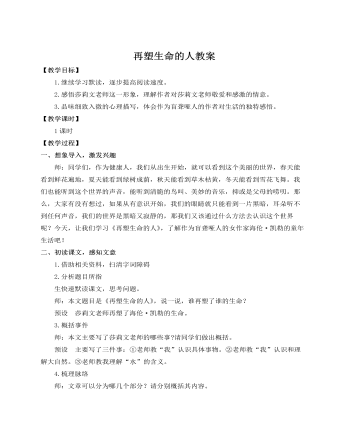
人教部编版七年级语文上册再塑生命的人教案
海伦·凯勒一岁多时不幸染上疾病,致使她双目失明、双耳失聪,随之又丧失了说话的能力。从此,她坠入了一个黑暗而沉寂的世界,陷入了痛苦的深渊。17岁,海伦·凯勒考进哈佛大学,还掌握了英、法、德、拉丁和希腊五种语言。大学期间,她开始写作。毕业后,她把自己的一生献给了盲人福利和教育事业,并在繁忙的工作中先后完成了14部具有世界影响的著作,最著名的是其自传《假如给我三天光明》。海伦·凯勒无比敬爱和感激自己的老师莎莉文,她说:“假如给我三天光明,我首先要长久地凝视我的老师——安妮·莎莉文!”海伦把自己的学习分成四个步骤:1.每天用三个小时自学。2.用两个小时默记所学的知识。3.再用一个小时的时间将自己用三个小时所学的知识默写下来。4.剩下的时间她运用学过的知识练习写作。在学习与记忆的过程中,她只有一个信念:她一定能够把自己所学习的知识记下来,使自己成为一个有用的人。她每天坚持学习10个小时以上,经过长时间的刻苦学习,她掌握了大量的知识,能熟练地背诵大量的诗词和名著的精彩片段。
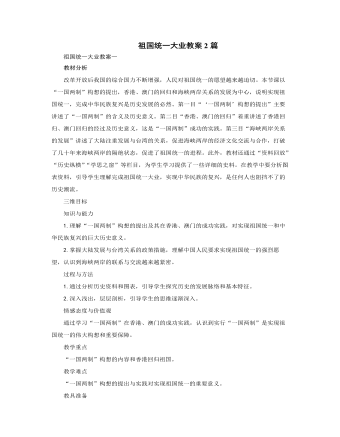
人教版高中历史必修1祖国统一大业教案2篇
教材分析改革开放后我国的综合国力不断增强,人民对祖国统一的愿望越来越迫切。本节课以“一国两制”构想的提出,香港、澳门的回归和海峡两岸关系的发展为中心,说明实现祖国统一,完成中华民族复兴是历史发展的必然。第一目“‘一国两制’构想的提出”主要讲述了“一国两制”的含义及历史意义。第二目“香港、澳门的回归”着重讲述了香港回归、澳门回归的经过及历史意义,这是“一国两制”成功的实践。第三目“海峡两岸关系的发展”讲述了大陆注重发展与台湾的关系,促进海峡两岸的经济文化交流与合作,打破了几十年来海峡两岸的隔绝状态,促进了祖国统一的进程。此外,教材还通过“资料回放”“历史纵横”“学思之窗”等栏目,为学生学习提供了一些详细的史料。在教学中要分析图表资料,引导学生理解完成祖国统一大业,实现中华民族的复兴,是任何人也阻挡不了的历史潮流。
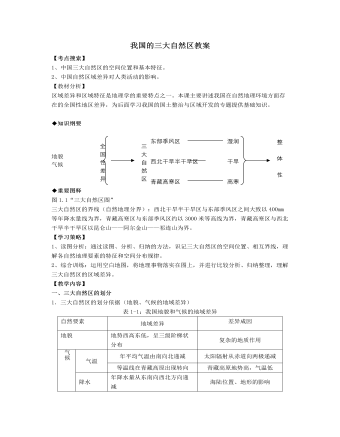
人教版高中地理选修2我国的三大自然区教案
1、中国三大自然区的空间位置和基本特征。2、中国自然区域差异对人类活动的影响。◆重要图释图1.1“三大自然区图”三大自然区的界线(自然地理分界):西北干旱半干旱区与东部季风区之间大致以400mm等年降水量线为界,青藏高寒区与东部季风区约以3000米等高线为界,青藏高寒区与西北干旱半干旱区以昆仑山——阿尔金山——祁连山为界。【学习策略】1、读图分析:通过读图、分析、归纳的方法,识记三大自然区的空间位置、相互界线,理解各自然地理要素的特征和空间分布规律。2、综合训练:运用空白地图,将地理事物落实在图上,并进行比较分析、归纳整理,理解三大自然区的区域差异。【教学内容】一、三大自然区的划分1.三大自然区的划分依据(地貌、气候的地域差异)
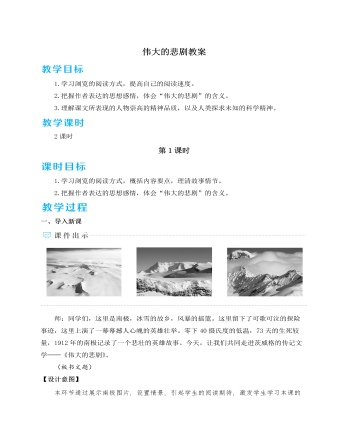
人教部编版七年级下册伟大的悲剧教案
预设 示例:(1)斯科特,寒冷的冰雪虽然冻住了你的身体,但它却冻不住你那高尚无比的灵魂。(2)威尔逊博士,凶猛的暴风雪只是带走了你的身躯,却没有带走你那热爱科学、无私奉献的精神和对祖国的那份深沉的爱。2.以史明鉴,畅写启示。(1)畅写启示。师:作者在课文结尾满怀深情地写道:“一个人虽然在同不可战胜的厄运的搏斗中毁灭了自己,但他的心灵却因此变得无比高尚。所有这些在一切时代都是最伟大的悲剧。”联系实际,说说你所知道的“伟大的悲剧式”的人物或事件,这些人物或事件对你有什么启示?把自己的想法写出来。(2)引导交流。“伟大的悲剧式”的人物或事件及其启示:示例一:美国的航天飞机“挑战者号”在升空约72秒后突然爆炸,机上7名宇航员全部罹难。
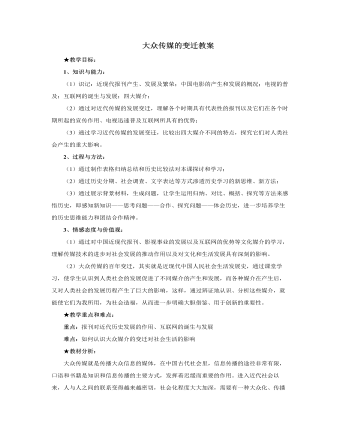
人教版高中历史必修2大众传媒的变迁教案
【课后研讨】当互联网正大踏步走进人类生活的时候,人们对网络作用的认识似乎还是模糊不清。一种意见认为,作为中学生,他们上网的机会很多,互联网向他们展示了各类知识结构,网络为他们提供了大量信息,又给他们提供了一个接触社会的个性化和国际化的空间,给了他们一个展示自身能力的大舞台,所以他们对于知识选择的灵活性大大增加,学习的主动性也大大提高,学习的内容自然大大超出了狭隘的课本范围,这对于学生能力的提高应是大有裨益的。另一种意见认为,网络的出现无疑为推进素质教育提供了一块绿洲.但部分中学生上网更多的是为了消遣和娱乐,因为网络--这个完全虚拟的世界是他们放松自己的最佳场所。同时也许正基于这一点,家长和师长才会对中学生上网出现不同程度的抵制,因为他们认为网上娱乐分散了他们过多的精力,会对学业造成影响;更为重要的是,他们害怕网络上的不良信息对他们的身心不利。
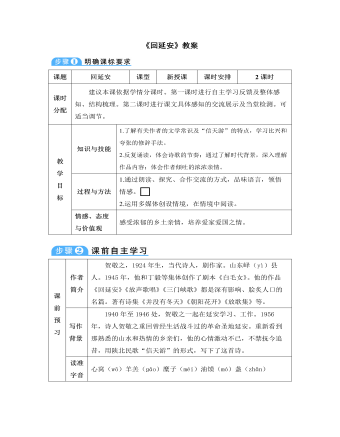
部编版语文八年级下册《回延安》教案
【初读课文,整体感知】1.诗歌共分为五小节,这五小节分别写了什么内容?第一小节:阔别十年重回延安;第二小节:追忆当年战斗生活;第三小节:亲人相见话延安;第四小节:喜看延安今繁华;第五小节:颂延安光辉历史。2.试想想诗人写作这首诗抒发思想情感的线索是什么?讨论、明确:全诗以诗人离别10年后重返延安的所见所闻所想为线索。【细读课文,仔细品味】1.作者在第一节中是怎样通过一系列动词表现情感的?“抓”“贴”等逼真的动作,表现了诗人回到延安时的激动情景。“双手搂定宝塔山”的“搂”字,写尽了作者对延安的怀念。“唱”“笑”“招”具有拟人的色彩,渲染了欢乐的气氛。最后一个“扑”字,强烈、准确地表达出作者的想念。2.第二节中,“二十里铺送过柳林铺迎,分别十年又回家中”在结构上有什么作用?
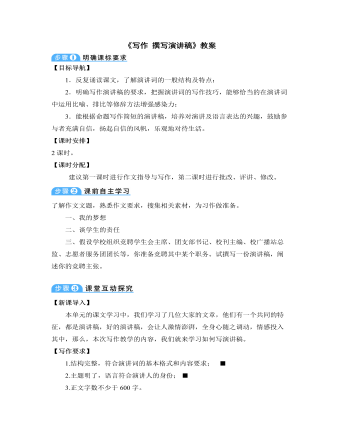
部编版语文八年级下册《写作:撰写演讲稿》教案
3.要语言流畅,不要拖泥带水要把演讲者在头脑里构思的一切都写出来或说出来,让人们看得见,听得到,就必须借助语言这个交流思想的工具。写作演讲稿在语言运用上应注意以下三个问题:(1)口语化。“上口”“入耳”,这是对演讲语言的基本要求,也就是说演讲的语言要口语化。演讲,说出来的是一连串声音,听众听到的也是一连串声音。听众能否听懂,要看演讲者能否说得好,更要看演讲稿是否写得好。如果演讲稿不“上口”,那么演讲的内容再好,也不能使听众“入耳”,完全听懂。写作演讲稿时,应把长句改成短句,把倒装句改成正装句,把单音词换成双音词,把听不明白的文言词语、成语改换或删去。演讲稿写完后,要念一念,听一听,看看是不是“上口”“入耳”。
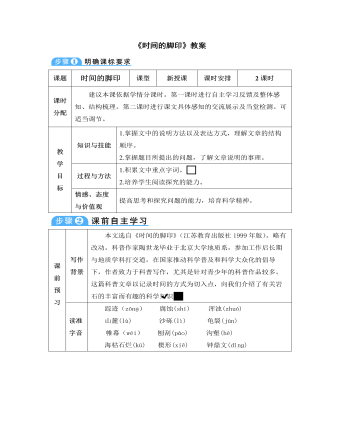
部编版语文八年级下册《时间的脚印》教案
【初读课文,整体感知】1. 以《时间的脚印》为题目有什么好处?文章的题目《时间的脚印》,是从高士其《时间伯伯》一诗中引申借用来的。其拟人化手法的运用,形象地说明了那些形形色色、大大小小的岩石中都潜藏着时间的踪影,以引起人们的探究欲望和阅读兴趣。【再读课文,梳理结构】1.第一部分(第1至第4自然段)说明岩石“是记录时间的方式中最重要的一种”。2.第二部分(第5至第29自然段)分层次地详细说明岩石是怎样记录时间的。这部分分三层。3.第三部分(第30自然段至全文完)总结全文,说明岩石记录时间的意义,号召人们进一步去大自然找寻时间的踪影,去一步步走向地下的宝库。【感悟精彩句子】1.“狂风来了,洪水来了,冰河爬来了”。
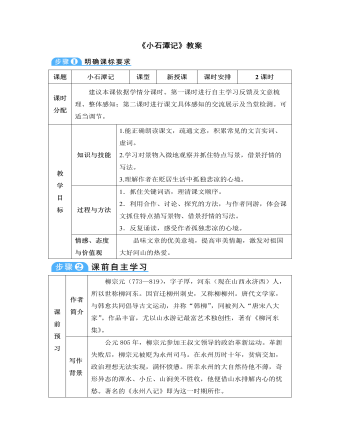
部编版语文八年级下册《小石潭记》教案
【品读课文,把握情感】1.小石潭到底有哪些乐趣呢?(找出“乐”的句子)(1)闻水声,如鸣珮环,心乐之。(2)似与游者相乐。2.深入探究,走近柳宗元。 “一切景语皆情语”,面对如此优美的景色,作者的心情却是“悄怆幽邃”。(播放一首古筝乐曲)这首古筝曲能为课文朗诵配乐吗?你能结合写作背景,说说你的理解吗?作者是被贬官到永州,不幸的遭遇令他感伤,本来想寄情于山水,遣散心中的郁闷,小石潭的美景使他惊叹不已,流连其中,得到了不少乐趣,暂时忘记了心中的痛苦,可是小石潭风景虽美却过于幽静冷清,游玩的时间一长,寒气透骨,难免触景生情,不由得忆起了自己的坎坷命运,忧郁、悲凉的心情自然地流露出来。3.柳宗元怀才不遇的悲凉郁闷,透过文字显现出来了。那么还有哪些中国文人用文字来书写心中壮志难酬的情感?
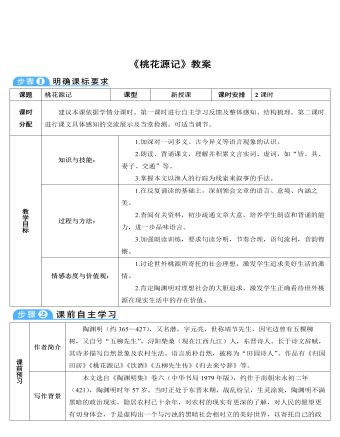
部编版语文八年级下册《桃花源记》教案
首先,我让学生结合书下注释,自行朗读课文。在读准字音的基础上,由老师带感情朗读,配合优美的乐曲,一下子便把学生带到课文的意境中,然后再由学生仿读,边读边体会,读中导,读中悟。接着,给学生自主学习的空间。我要求同学们凭借下面的注释,结合语境翻译课文,然后小组自主探究,最后小组提出疑难点,教师在班上引导学生解决,并把文言实词虚词归类。三、反复诵读,品味佳句,突破重难点。如果说前面的读是在为品做准备,那么真正的品就在学生对文章优美佳句的欣赏上,要求学生仔细品味自认为文中写得好的语句。这一环节我首先让学生自行找出自己喜爱的地方,然后说明喜爱的原因。这既是一种对课文的理解,又是一种知识的迁移。
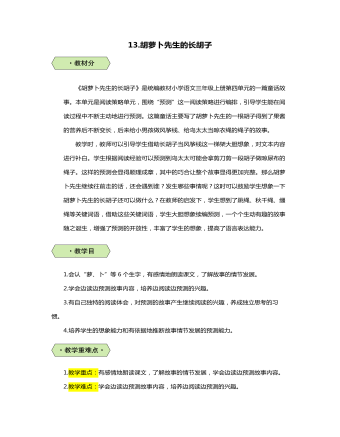
统编版三年级语文上胡萝卜先生的长胡子教案
1.胡萝卜先生的胡子可真长啊!胡萝卜先生继续走着,接下来会发生什么有趣的事情呢?(学生发挥想象,预测接下来的故事情节。) 2.自读课文第4-8自然段,看看与你们自己的预测一样不一样吧!学生自己读故事,发现自己的预测和文本内容不一样时及时修正自己的想法。(1)出示关键句:线实在太短了,他的风筝只能飞过屋顶。根据课文内容,预测接下来的故事发展。(2)出示关键句:鸟太太正在找绳子晾小鸟的尿布。根据插图中鸟太太遇见胡萝卜先生惊喜的神态,预测接下来的故事发展。 3.文章写完了吗?为什么?(结尾的省略号就告诉我们这个故事还没有结束。) 既然没有结束,我们就来续编故事吧!可以结合上面的男孩的语言、动作续编故事,也可以有自己新奇的想法。大家之前预测的故事发展只要合乎情理也可以继续预测。
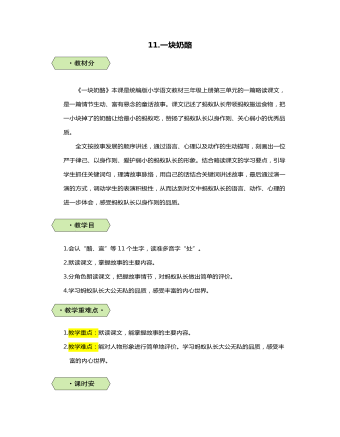
统编版三年级语文上一块奶酪教案
(1)板书“奶酪”,学生齐读。 (2)提问:二年级时,我们学过哪个关于奶酪的故事?(学生自由回答)(3)教师小结:是啊,在《狐狸分奶酪》这个故事里,为了从小熊兄弟的手里骗走美味的奶酪,狐狸可真是费尽心机哪!2.引导:今天我们要学的课文也讲到了奶酪,小蚂蚁想方设法搬奶酪,看来奶酪很诱人呢!奶酪的味道到底怎么样呢?我们一起来品味品味吧。(板书课题,学生跟读)3.设疑激趣(1)出示课文中的句子: ◇奶酪多诱人啊!抬着它,不要说吃,单是闻闻,都要淌口水。 ◇他低下头,嗅嗅那点儿奶酪渣,味道真香!
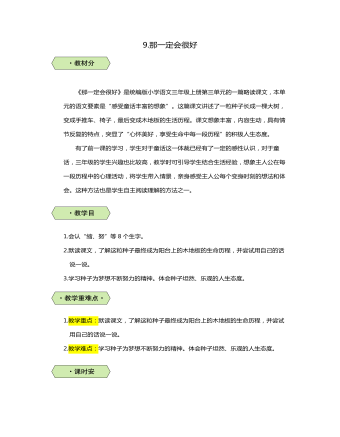
统编版三年级语文上那一定会很好教案
1.同学们,通过刚才的阅读,我们了解了主人公从一粒种子到木地板的变化历程,你觉得这粒种子不断地追求“很好”的过程,给你带来了怎样的启示?2.小组内交流,讨论课文蕴含的道理。3.教师点拨:这粒种子不断成长,渴望成材。成材之后,又在不同的阶段无私地奉献自己的才华和力量,实现了自我价值和社会价值的统一,是值得尊重的。4.学生说自己的体会。5.课文主旨探究。这是一篇优美动人的童话故事,写了一粒种子,怀揣梦想,努力生长,长成了一棵高大的树,在经历了变成手推车、椅子、木地板的过程中,告诉我们做人要像这棵树一样,有理想、有追求,并且为了实现自己的理想而努力奋斗的道理。

